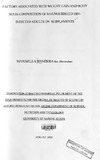| dc.description.abstract | Malnutrition is a frequent complication among HIV-infected persons and is associated
with faster disease progression and mortality, and yet little has been documented on
influence of food supplements on management of HlV /AIDS, in resource limited areas.
A longitudinal study which employed descriptive and analytical methods of data
collection and presentation was designed to assess the effect of dietary supplemention of
HlV /AIDS patients on ARTs. A previously pre-tested structured questionnaire was used
to interview a sample of 220 HlV /AIDS patients attending Maragua and Nyeri District
hospitals. Data was collected on social demographic and socio-economic characteristics
of the patients, dietary consumption and diversity, the anthropometry and morbidity of
the patients.
The patients were randomly selected into two groups of 110 patients each. One group
was given nutritional counselling and food supplements, while the other was given
nutritional counselling only. Their nutritional status was recorded from baseline upto
three months, using MUAC, BMI, body fat content and lean mass content. The data was
collected and analyzed for change.
The results showed that there was change in weight for 86.7% of the participants over a
period of 3 months. Though there was no significant change in BMI, MUAC, body fat
content and body lean mass between and within the intervention groups over the study
period. There was also no significant association of change in MUAC, body fat content
and body lean mass with the independent variables. However BMI had significant association with money spent on food(p=0.018) and main
source of food for the household(p=0.04l). The main source of food showed a weak
correlation(r=O.16), while money spent on food indicated a negative correlation (r=
-0.20) with change in BMI. There was also a weak correlation(r= 0.33) between the two
independent variables. The odds ratio analysis indicated that those who depend on farm
produce are 1.8 times more likely to improve in weight than those who purchased their
food.
The study was not able to establish that food supplements lead to increased weight gain
and change in body composition within the study period. The Nutritional counselling
alone effects increase in individual dietary diversity and food consumption. The
nutritional counselling provided information that lead to change in the eating habits. At
the same time, receiving food supplements had a negative influence on the consumption and diet diversity.
The study was able to establish that socio-economic and socio- demographic attributes
can influence the nutritional status of PLWHA. The main source of food for the
household significantly influenced the chances of improving the nutritional status of
the participants. At the same time the percentage of the household budget used on food
purchase influenced change in the nutritional status of individuals in that household. As
the percentage increased there was decrease in the nutritional status. | en |

